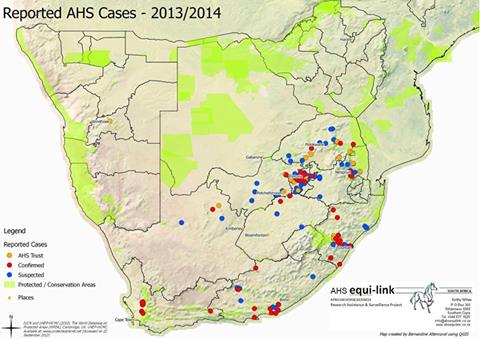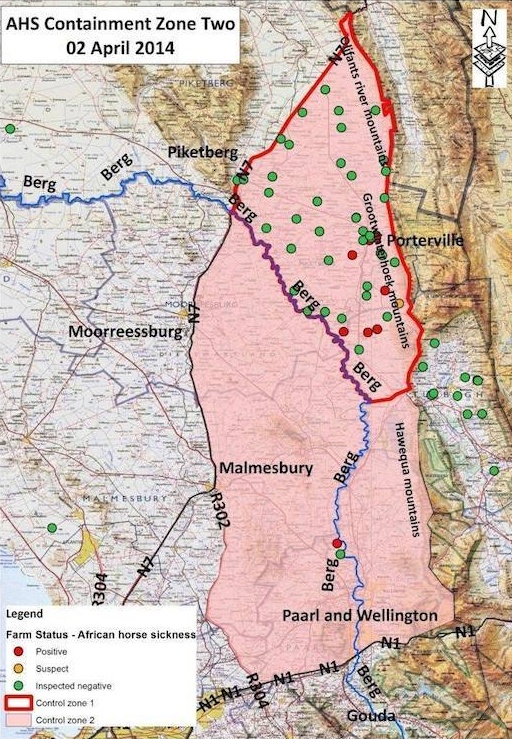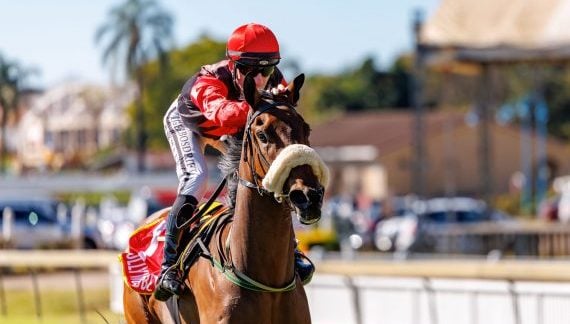
AHS Outbreak Map as at 15 April 2014
In a public situation report dated 14 April 2014, State Veterinarian Dr John Grewar brings us up to speed on the developments of the African Horse Sickness situation in the Western Cape.
“A second property in Wellington, closer to the Hawequas mountain range near Groenberg has been confirmed as having a positive AHS case present. There have been no mortalities on this property.
There are currently a total of 14 confirmed AHS properties in the outbreak area with a total of 40 cases and 7 deaths as a result of the virus. Two of the confirmed properties are near Wellington in the AHS surveillance zone.
Two 10 km surveillance zones have been demarcated around the Wellington cases and officials have been and will continue to perform clinical surveillance and census in that area.
We remind owners that vaccination against AHS in the AHS surveillance zone is only to be performed after the required permissions from State Vet Boland (021 808 5253) has been obtained.
Information regarding the movement of horses can be obtained from the relevant area’s State veterinarian.
It is currently unknown when the containment zone and control measures will be relaxed.
There has been another AHS case in the Uniondale area of the Western Cape which is thought to be unrelated to the current situation in the Porterville/Wellington area. Uniondale falls within the AHS infected zone of South Africa. In this case clinical signs of the more typical lung form of the disease were seen.”

Containment Zone Map
We remind readers that the containment zone is still in force and no horses, mules, donkeys or zebra (equids) may be moved within, into, out of or through the zone described below:-
Eastern Boundary: The Piekenierskloof pass in the North along the Olifantsrivier mountain range south to the Grootwinterhoek mountains and south to Gouda along the Obiekwa mountains. Extending further south along the Limiet mountain range and ending at the intersection between the N1 highway and the Hawequas mountain range at the Huguenot tunnel.
Southern Boundary: The N1 highway between the Huguenot tunnel and the intersection of the N1 and the R304 near Joostenberg.
Western and Northern Boundary: The R304 from the intersection of the N1 and the R304 near Joostenberg extending North West to Klipheuwel. The R302 extending between Klipheuwel and Malmesbury and then the N7 highway between Malmesbury and the Piekenierskloof pass in the North East.
This movement ban is in force with immediate effect and will remain in place until repealed by the Veterinary Services of the Western Cape Department of Agriculture.
Movement of horses via the N7, R302, R304 and N1 on the boundary of this zone will be allowed, but should be restricted to daylight hours without any stopping or deviation.
All horses within the containment zone must be stabled as far as possible from 2 hours before sunset until 2 hours after sunrise. In addition they must be treated with effective insect repellents to prevent midges feeding on them.
All occurrences of horses becoming sick or dying must immediately be reported to the closest State Veterinarian (see contact details below) in order for Veterinary Services to investigate the possible cause of such disease or death.
Horse owners in the AHS Surveillance Zone need to note that no systematic vaccination against AHS is allowed in this zone. Permission to vaccinate must be obtained from the Western Cape State Veterinary Service in the prescribed format – please contact State Vet Boland in this regard.
Infringement of any of these conditions may lead to prosecution in terms of the Animal Diseases Act.
Any queries can be directed to:-
Contacts: State Veterinarian Malmesbury – Dr S Davey: 022 482 1380 / 083 642 0603
State Veterinarian Boland – Dr G Buhrmann: 021 808 5253 / 083 642 0602
State Veterinarian Epidemiology – Dr J Grewar: 021 808 5056 / 083 642 0610








